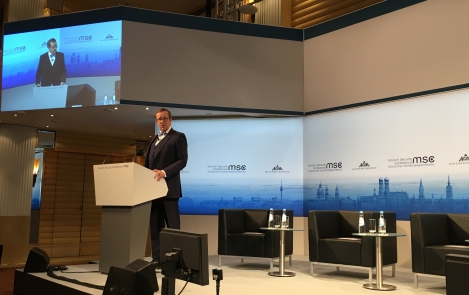-
Reset
+


President Ilves defined today’s most acute cyber problems at a discussion at the Munich Security Conference
Friday, 12 February 2016 15:03
President Toomas Hendrik Ilves, one of the presenters at the event that preceded the 52nd Munich Security Conference, gave a crash course on cyber security to approximately 500 people and spoke about the three main problems of the cyber world.
Confidentiality of personal data is the issue that the public is most worried about, despite the fact that people have chosen to surrender some of their privacy themselves by using smart applications or social networks, stated President Ilves.
Another, and increasingly important, problem that he emphasised is the integrity of data communicated within networks, i.e. maintaining the authenticity of such data and protecting the data from unauthorised modification. Integrity is becoming more and more important as a consequence of the spread of Internet of Things (IOT), as nobody wants the technology connected to the network to behave unpredictably due to false data being fed to it.
The third issue mentioned by President Ilves is the importance of the availability of data; he recalled the service interruption attacks against Estonian e-services in spring 2007, which resulted in the temporary unavailability of websites that offered e-services to people.
The Estonian Head of State shared the stage with Gerhard Eschelbeck, who is responsible for security and privacy engineering at Google; Christopher Painter, the U.S. Department of State Coordinator for Cyber Issues, Jane Holl Lute, Chief Executive Officer (CEO) of the Center for Internet Security (CIS) (USA) and Birgitta Jonsdottir, member of the Icelandic Parliament.
This morning, President Ilves introduced the cyber security round table organised by the East-West Institute; 30 of the world's leading high-level cyber experts from governments, companies and the third sector were present at the event. They discussed the need for international covenants to regulate cyber space as the problems are of a cross-border nature, and the fact that the required agreements cannot be expected to be concluded without co-operation between the private and public sector. The Estonian Head of State invited politicians to co-operate with technicians and take responsibility for the emergence of agreements that regulate the cyber world.
President Ilves also met today in Munich with Vint Cerf, the developer of TCP/IP technologies, who has been described as one of the "fathers of the Internet" and a technology evangelist; his research has been used to develop Estonia's e-governance system.
Office of the President
Public Relations Department




